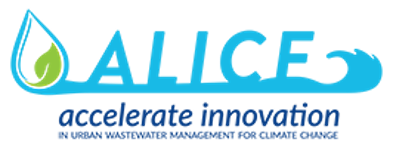
ALICE – AcceLerate Innovation in urban wastewater management for Climate changE
Project Overview
The ALICE project aims to accelerate innovation in urban wastewater management for addressing the effects of climate change. In this frame, it will identify solutions and seek to remove barriers in their adoption and implementation by fostering an effective interdisciplinary and inter-sectoral cooperation among researchers.
Through mobility (secondments) of staff members facilitating the transfer of knowledge and boosting staff skills and career perspectives, ALICE aims to: explore society’s role, social behaviour and acceptability in the development of innovative management systems for urban WW; improve the urban resilience of WW infrastructures; enhance the reuse of reclaimed WW and resource recovery, exploring the leading edge technologies of urban WW treatment to broaden its dimension in Europe; explore the WW and energy nexus in WW treatment plants to reduce their carbon footprint, adopting a holistic approach to resource efficiency.
ALICE will develop an innovative interdisciplinary research programme, combining different competences (engineering, chemistry, economics, planning, governance and law, biology), methodologies and tools, following a problem-focused approach. Different disciplines and sectors will work together on specific themes to address the four objectives:
- Urban resilience and wastewater infrastructures
- Wastewater and energy nexus
- Reclaimed wastewater reused and resource recovery
- Society’s role in introducing innovative urban wastewater systems
Project Results
Main results achieved so far from the beginning of the project to the end of the period covered by the report:
- Researchers are developing a methodology to screen a wastewater system for vulnerabilities and to identify measures to improve resilience.
- The methodology has been identified and series of interviews with senior managers at the water utility in Belfast were held.
- Research has been ongoing into the benchmarking of energy consumption in wastewater treatment plants.
- Wastewater utilities have started to trial a benchmarking software previously developed by one of the partners.
- As regards the use of low carbon technologies to reduce the CO2 emissions of wastewater treatment plants, wastewater utilities have worked with academics to investigate the potential of:
i) The thermal energy recovery from heat pumps
ii) The optimal integration of renewable sources in wastewater facilities
- As regards innovative technologies to enhance the potential of water reuse, some ALICE partners have discussed a new technology based on photo-electrocatalysis at laboratory scale as potential alternative process for urban wastewater purification.
- Three stakeholder workshops have been organized and used by researchers to complete the questionnaire that will be submitted to the wider public in the second reporting period to understand the acceptability issues of citizens.

